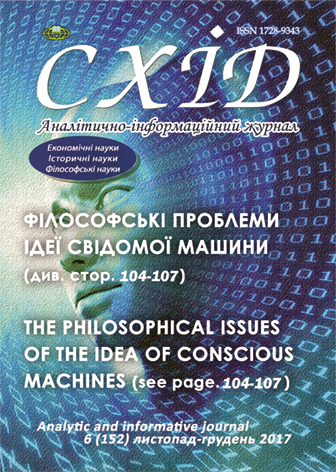The philosophical issues of the idea of conscious machines
DOI:
https://doi.org/10.21847/1728-9343.2017.6(152).122367Keywords:
artificial consciousness, artificial intelligence, cognitive robotics, conscious machine, cyborgAbstract
The study outlines the existing and potential philosophical issues of the idea of conscious machines originated from the development of artificial consciousness within the framework of contemporary research of artificial intelligence and cognitive robotics. The outline shows that the idea of conscious machines is concerned with two big philosophical issues. The first philosophical issue is a definition of consciousness, taking into account the selection of a set of objects that can have consciousness (human being, living being or machine), the typology of consciousness, the clarifying of the nature of consciousness' carriers and the relationship between consciousness and its environment (including social and cultural) and the relationship between consciousness and language, in order to create an artificial consciousness within a machine, making that machine conscious. The second philosophical issue is a clarification whether only artificially created machines can be conscious machines, or cyborgizated (engineered) human beings also can be considered of conscious machines. These philosophical issues show that there can be two ways to create conscious machines: 1) the creating of artificial consciousness within artificially created machine; and 2) the cyborgization of human being, transforming it into artificially created machine possessed natural consciousness (or even possessed consciousness artificially transformed from natural into artificial).
Downloads
References
Rayhert, K. W. (2016). The Theoretic Loading of the Conceptual Metaphor of Logical Language. Filosofiia i politologiia v konteksti suchasnoyi kultury, №2 (11), pp. 144-150 (ukr).
Aleksander, I. (1995). Artificial Neuroconsciousness: An Update, available at: https://web.archive.org/web/19970302014628/http://www.ee.ic.ac.uk/research/neural/publications/iwann.html. DOI: 10.1007/3-540-59497-3_224.
Block, N. (1997). On a Confusion about a Function of Consciousness, in Block N., Flanagan O. and Guzeldere G. (Eds.), The Nature of Consciousness. Philosophical Debates. Cambridge, MA: The MIT Press, pp. 375-416.
Boyles, R. J. (2012). Artificial Qualia, Intentional Systems and Machine Consciousness, available at: https://philpapers.org/archive/BOYAQI.pdf.
Buttazzo, G. (2011). Artificial Consciousness: Utopia or Real Possibility? Computer, №7, pp. 24-30. DOI: 10.1109/2.933500.
Chalmers, D. J. (2011). A Computational Foundation for the Study of Cognition. Journal of Cognitive Science, №4, pp. 325-359. DOI: 10.17791/jcs.2011.12.4.325.
Chalmers, D. J. (2010). Facing Up to the Problem of Consciousness. Chalmers, D. J. (2010). The Character of Consciousness. Oxford; New York: Oxford University Press, pp. 3-27. DOI: 10.1093/acprof:oso/9780195311105.003.0001.
Dehaene, S., Lau, H. & Kouider, S. (2017). What is Consciousness, and Could Machines Have It? Science, №6362, pp. 486-492. DOI: 10.1126/science.aan8871.
Fodor, J. (1975). The Language of Thought. New York: Thomas Y. Crowell.
Gamez, D. (2008). Progress in Machine Consciousness. Consciousness and Cognition, №3, pp. 887-910. DOI: 10.1016/j.concog.2007.04.005.
Haikonen, P. O. (2003). Cognitive Approach to Conscious Machines. Exeter: Imprint Academic.
Haikonen, P. O. (2007). Robot Brains: Circuits and Systems for Conscious Machines. Hoboken: Wiley-Interscience.
Haladjian, H. H. (2016). Consciousness and Language. Psychology Today, available at: https://www.psychologytoday.com/blog/theory-consciousness/201608/consciousness-and-language.
Harnad, S. (2000). Correlation vs. Causality: How/Why the Mind/Body Problem is hard. Journal of Consciousness Studies, №4, pp. 54-61.
La Mettrie, J. O., de (1865). L'homme machine. Paris: Frederic Henry.
Locke, J. (1999). An Essay Concerning Human Understanding. New York: Oxford University Press USA.
Lycan, W. (1996). Consciousness and Experience. Cambridge, MA: The MIT Press.
Markoff, J. (2016). Machines of Loving Grace: The Quest for Common Ground between Humans and Robots. New York: Ecco.
Neukart, F. (2016). Reverse Engineering the Mind: Consciously Acting Machines and Accelerated Evolution. Berlin: Springer. DOI: 10.1007/978-3-658-16176-7.
Pitrat, J. (2009). Artificial Beings: the Conscience of a Conscious Machine. Hoboken: Wiley-ISTE.
Reggia, J. A. (2014). Conscious Machines: The AI Perspective, available at: https://www.aaai.org/ocs/index.php/FSS/FSS14/paper/view/9107/9078.
Reggia, J. A. (2013). The Rise of Machine Consciousness: Studying Consciousness with Computational Models. Neural Network, vol. 44, pp. 112-131. DOI: 10.1016/j.neunet.2013.03.011.
Sassoon, L. '(2017). 'Robot Intelligence is Dangerous': Expert's Warning after Facebook AI 'Develop Their Own Language'. Mirror, available at: http://www.mirror.co.uk/tech/robot-intelligence-dangerous-experts-warning-10908711.
Schlagel, R. H. (1999). Why not Artificial Consciousness or Thought? Minds and Machines, №1, pp. 3-28. DOI: 10.1023/A:1008374714117.
Velmans, M. (2009). How to Define Consciousness - and How not to Define Consciousness. Journal of Consciousness Studies, №5, pp. 139-156.
Downloads
Published
How to Cite
Issue
Section
License
Copyright (c) 2018 Konstantin Rayhert

This work is licensed under a Creative Commons Attribution-NonCommercial-NoDerivatives 4.0 International License.
1. Authors bear responsibility for the accuracy of facts, quotations, numbers and names used.
2. Manuscripts are not sent back.
3. The publisher does not always agree with the authors' opinion.
4. The authors reserve the right to authorship of the work and pass the first publication right of this work to the journal under the terms of a Creative Commons Attribution-NonCommercial-NoDerivatives 4.0 International License. This license allows others to distribute (copy) the published work for non-commercial purposes, provided there is mandatory attribution to its authors and a link to the first publication in our journal.
5. The authors have the right to conclude separate supplement agreements that relate to non-exclusive work distribution in the form in which it has been published by the journal (for example, to upload the work to the online storage of the journal or publish it as part of a monograph), provided that the reference to the first publication of the work in this journal is included.

